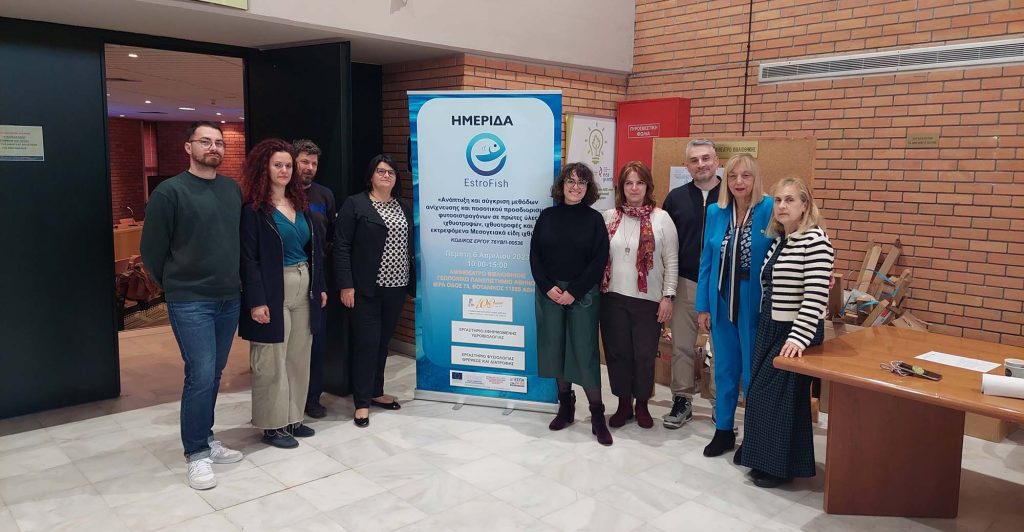Number of Undergraduate Students
Academic Year: 2016-2018
Number of Postgraduate Students
Number of Phd Students
On Thursday, April 6, 2023, a conference was held with great success at the Conference Room of the Library & Information Centre “Alexandros Poulovasilis” of the Agricultural University of Athens, on the topic: "Development and comparison of methods for the detection and quantification of phytoestrogens in fish feed raw materials, fish feed and farmed Mediterranean fish species". The conference took place in the context of the project "Development and comparison of methods for the detection and quantification of phytoestrogens in fish feed raw materials, fish feed and farmed Mediterranean fish species - EstroFish", with code: T6YBP-00536 (MIS: 5052097), falling into Special Actions " AQUACULTURE" - "INDUSTRIAL MATERIALS" - "OPEN INNOVATION IN CULTURE" and is carried out with the co-financing of Greece and the European Union, within the framework of the EPANEK 2014-2020 Operational Program: “COMPETITIVENESS -ENTREPRENEURSHIP - INNOVATION”. The EstroFish project is implemented by the Laboratory of Applied Hydrobiology and the Laboratory of Nutritional Physiology & Feeding of the Agricultural University of Athens.
The event was attended by the Vice-Rector for Academic and Administrative Affairs, Lifelong Learning and Extroversion of the Agricultural University of Athens, Mr. Emmanouil Flemetakis, Professor, who addressed a greeting. Then, the Vice-Rector for the European University, Internationalization and Student Affairs, Ms. Helen Miliou, Professor and Coordinator of the EstroFish project, outlined the objectives of the program and the implementation bodies.
At the first part of the Conference, speeches have been presented by the members of the research group of the Laboratory of Nutritional Physiology & Feeding of the Agricultural University of Athens, with issues pertaining to the application of high-performance liquid chromatography coupled to tandem mass spectrometry (LC-MS/MS) for the development of an accurate analytical method, enabling the simultaneous quantitation of the presence of 68 natural phytoestrogens, besides a spectral library for the qualitative determination of 74 phytoestrogens, inasmuch the development of methods to determine the phytoestrogen content of raw materials (meals and oils), fish feed of the greek market and fish tissues, including also its exploitation as a valuable biomarker for the discrimination of raw materials used for fish feed production.
At the second part of the Conference, speeches have been made by the members of the research group of the Laboratory of Applied Hydrobiology (A.U.A.), with subjects upon the effect of fish feed phytoestrogens on the growth characteristics and chemical composition of sea bream and sea bass, highlighting their antioxidant and anti-lipogenic effect on the liver and visceral fat of larger individuals, which however, leads to a tendency to reduce body weight gain, as well as the effect of fish feed phytoestrogens on biochemical parameters measured on the blood of sea bream and sea bass, pointing out the ability of phytoestrogens to reduce bad cholesterol (LDL) and hypoxia-indicative parameters, such as LDH and GPT, particularly in combination with high dietary levels of ω-6 fatty acids. In addition, an estrogenic effect of the phytoestrogens has been detected, as they caused an increase in vitellogenin levels in sea bream individuals (100 g.) after three months of rearing.
Furthermore, Ms. Efthymia Kotou, Researcher B', at the Hellenic Center for Marine Research (H.C.M.R.) has featured her presentation, entitled: "Phytoestrogens in fish feed raw materials and fish feed for Mediterranean farmed fish species: in vitro determination of their estrogenic and anti-estrogenic activity". The conference was concluded by an open discussion, on which the project team had the opportunity to answer questions, focus on specific research topics, clarify questions and exchange opinions about the physical object of the project.

